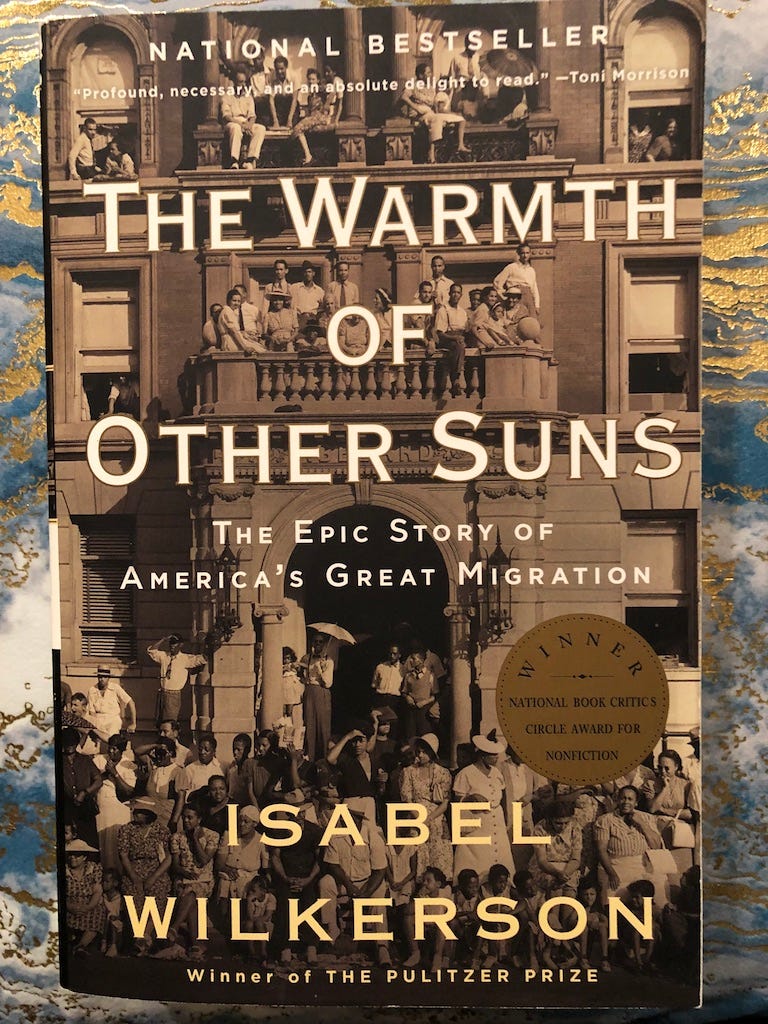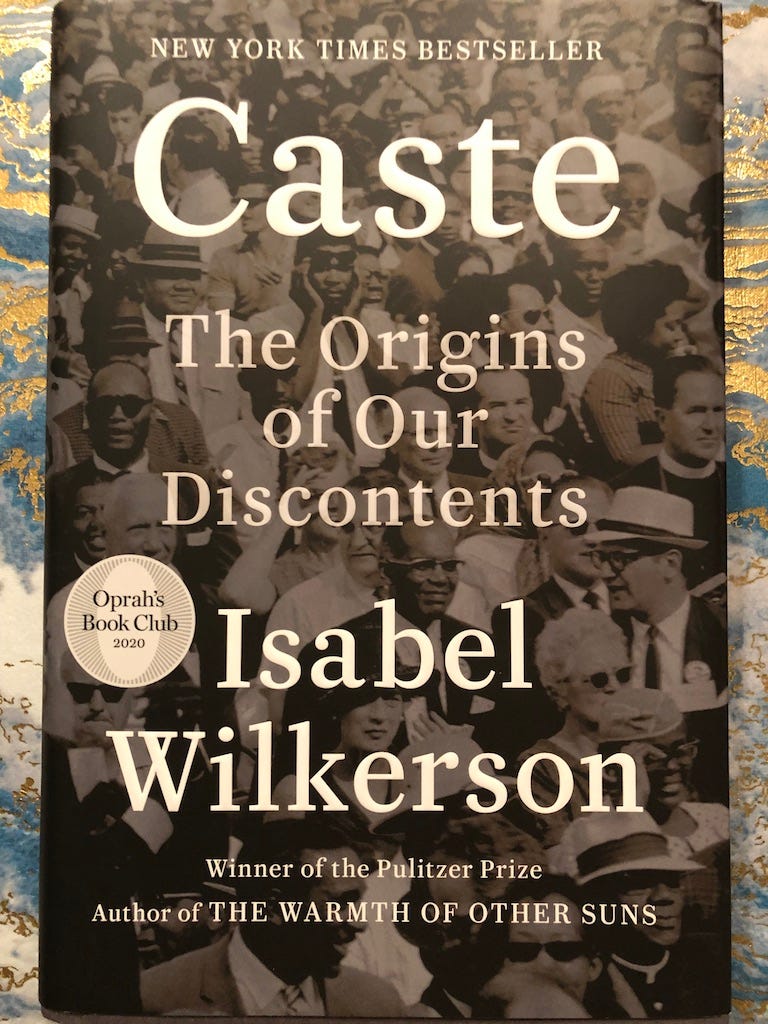Hello Reader Friends,
I am featuring one of my favorite writers today, another Black American who speaks to the history of racial injustice but also addresses the healing that can occur with being exposed to new perspectives.
“The Great Migration was the final break from an abusive union with the South. It was a step in freeing not just the people who fled, but the country whose mountains they crossed. Their exodus left a still imperfect but far different landscape than before the migration began.
It was, if nothing else, an affirmation of the power of an individual decision, however powerless the individual might appear on the surface.
‘In the simple process of walking away one by one,’ wrote the scholar Lawrence R. Rodgers, ‘millions of African American southerners have altered the course of their own and all of American history.’ ”1
The Warmth of Other Suns tells the true stories of three African Americans who migrated from the American South to states in the North and West during the Great Migration, a period from 1915 to 1970 when millions of Black Americans left the South for hope and freedom.
I had heard rumblings about The Warmth of Other Suns over the years, but I didn't seek out the book until our dear Aunt Susie recommended it to me a couple of years ago. (Thanks, Susie!)
This masterpiece of narrative nonfiction is not some dry history lesson. It is full of beautiful insights, empathy and expert research.
Isabel Wilkerson, a Pulitzer Prize-winning journalist and award-winning author, intuitively guides us into the life experiences of three migrants, Ida Mae Brandon Gladney, Robert Joseph Pershing Foster and George Swanson Starling, as they left harrowing circumstances in the South and traveled onward to new opportunities. In the telling of their separate stories, we learn of the discriminations, dangers and oppressions they encountered along the journey and in the new places where they came to settle.
Wilkerson shares from a place of empathy as a Black woman and also as a descendent of migrant parents from the South. The opportunities she was afforded would not have been possible without the courage of her parents to leave.
The Warmth of Other Suns is one of the most powerful and touching books I've ever read. I was particularly moved by a line in the story where Robert was driving solo cross-country in the 1950s to California. Robert was a medical doctor who had also served his country in the military and abroad. But when it came to the simple need for an exhausted traveler to find a bed for the night, he was an untouchable of the lowest caste — as hotels even in states outside of the South would not allow colored people. There were separate hotels for Black Americans in some communities, but one could not readily know whether they would find such accommodations on their journey.
Wilkerson writes, “Like most colored people making the journey, Robert could not pass for white and was not in a position to try to fool his way into a room which is not to suggest that all who could did. In fact, he found it sad and equally humiliating to have to deny who you were to get what you deserved in the first place.”2
Not long after I read The Warmth of Other Suns, Isabel Wilkerson published another book titled Caste: The Origins of Our Discontents in which she delves deeper into the American caste system, an ingrained hierarchy of castes/classes of Americans with slaves and their descendants at the very bottom. She references the caste system in India where those of the lowest caste have traditionally had no hope of upward mobility in society.
As with The Warmth of Other Suns, Caste takes us on a journey through racial oppression in America but tells the story through the eyes of people who have lived at the bottom of society with its barriers to freedom, safety and opportunity. She doesn’t back down from shining the spotlight on the mindsets that continue to oppress communities of color.
I was very struck by Wilkerson's appeal to her fellow Americans to seek to understand and not simply dismiss the burdens of caste that still affect our Black American brothers and sisters, and thereby still affect all of us. Her language touched me deeply as an intuitive empath myself, and I appreciated that she so eloquently stated what I have tried to convey to others who haven’t been willing to understand another perspective.
“Radical empathy… means putting in the work to educate oneself and to listen with a humble heart to understand another’s experience from their perspective, not as we imagine we would feel. Radical empathy is not about you and what you would do in a situation you've never been in and perhaps never will. It is the kindred connection from a place of deep knowing that opens your spirit to the pain of another as they perceive it.
Empathy is no substitute for experience itself. We don't get to tell a person with a broken leg or a bullet wound that they are or are not in pain. And people who have hit the caste lottery are not in a position to tell a person who has suffered under the tyranny of caste what is offensive or hurtful or demeaning to those at the bottom. The price of privilege is the moral duty to act when one sees another person treated unfairly. And the least that a person in the dominant caste can do is not make the pain any worse.
If each of us could truly see and connect with the humanity of the person in front of us, search for that key that opens the door to whatever we may have in common … it could begin to affect how we see the world and others in it. Perhaps change the way we hire or even vote. Each time a person reaches across caste and makes a connection, it helps to break the back of caste. Multiplied by millions in a given day, it becomes the flap of a butterfly wing that shifts the air and builds to a hurricane across the ocean.”3
I love that. I hope this idea of Radical Empathy resonates with you as it does with me. I believe my reader friends are truth-seekers who do understand this type of knowing. We can pray that more white Americans would open their hearts to this way of understanding. As Wilkerson shares, this kind of intentional listening, seeing and connecting can have profound affects across our world. When we choose to work on ourselves and open our hearts to healing in many forms, we transform the age we live in.
As I like to say, the healers are rising and are transforming the age we live in. The healers are rising, and you are one of them.
My gratitude and cheers to all of you healers who are rising. As Isabel Wilkerson says in her healing way, we have the power to break long-entrenched systems of oppression by simply being open to connecting with each other.
In Service to the Light,
Jen
Isabel Wilkerson, The Warmth of Other Suns, (First Vintage Books Edition, 2011), p. 538.
Ibid, p. 203
Isabel Wilkerson, Caste: The Origins of Our Discontents, (Random House, 2020), p. 386.







I've heard about this book as well! Thanks for sharing your takeaways. Feels like this radical empathy mentioned at the end is what makes keeps us "human" - at least with one another in the ability to really see and hear each other.
Thank you, Emily. Well-said about keeping us human. I highly recommend reading this great work.